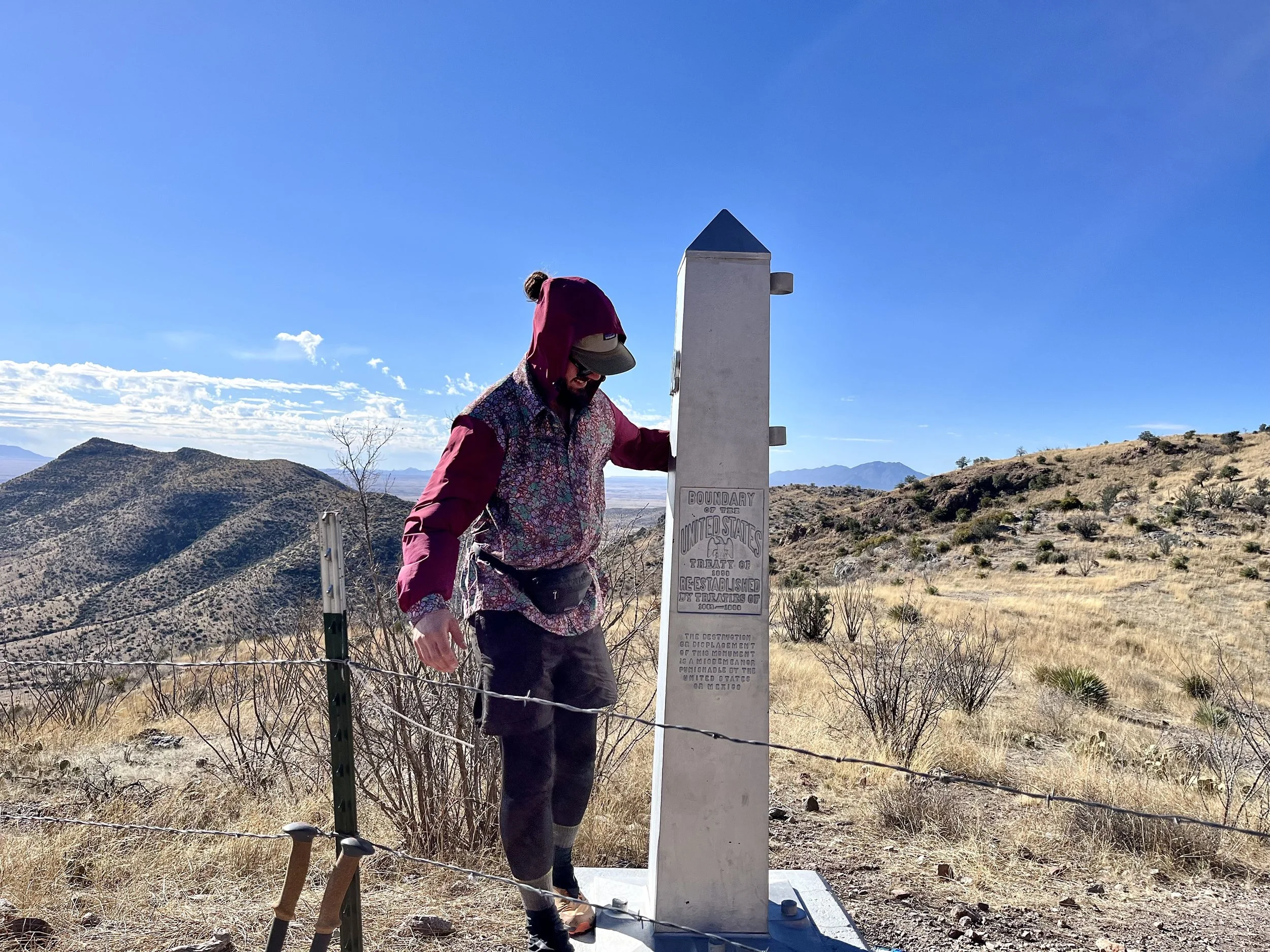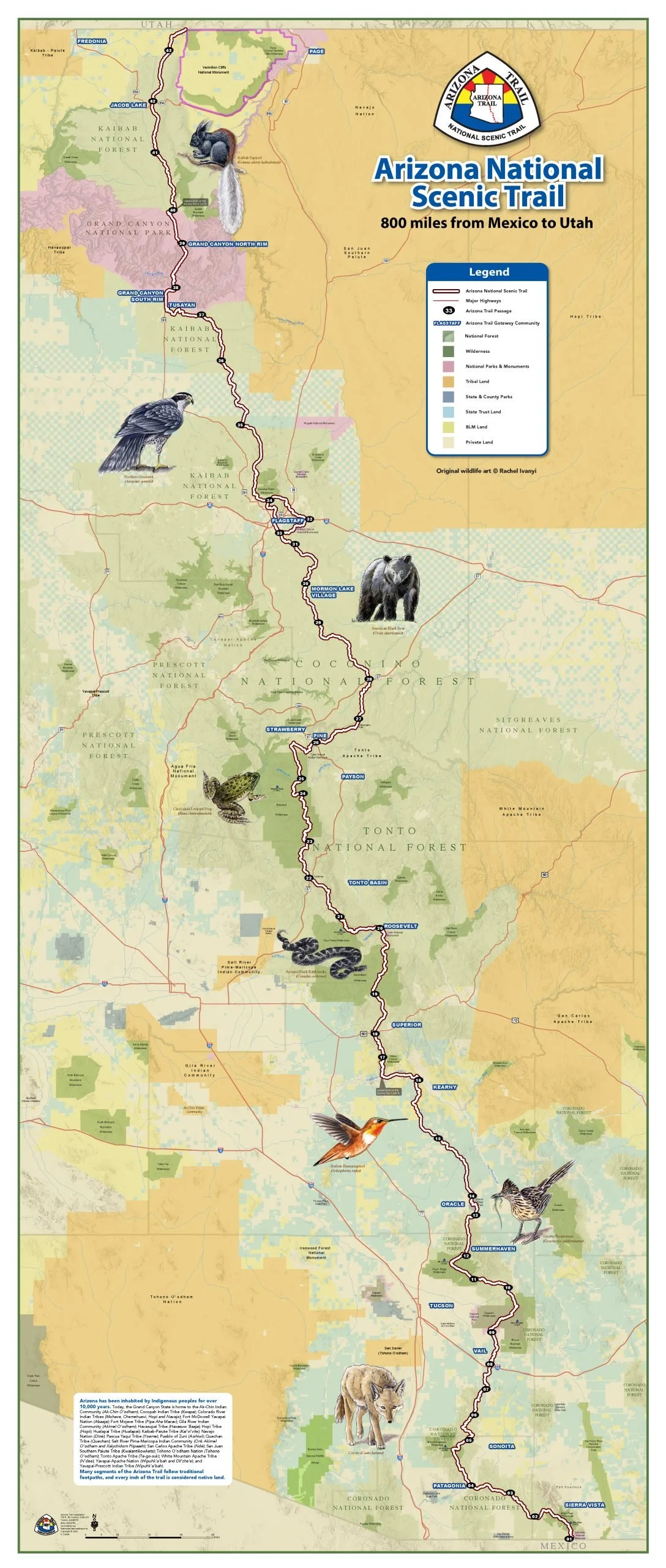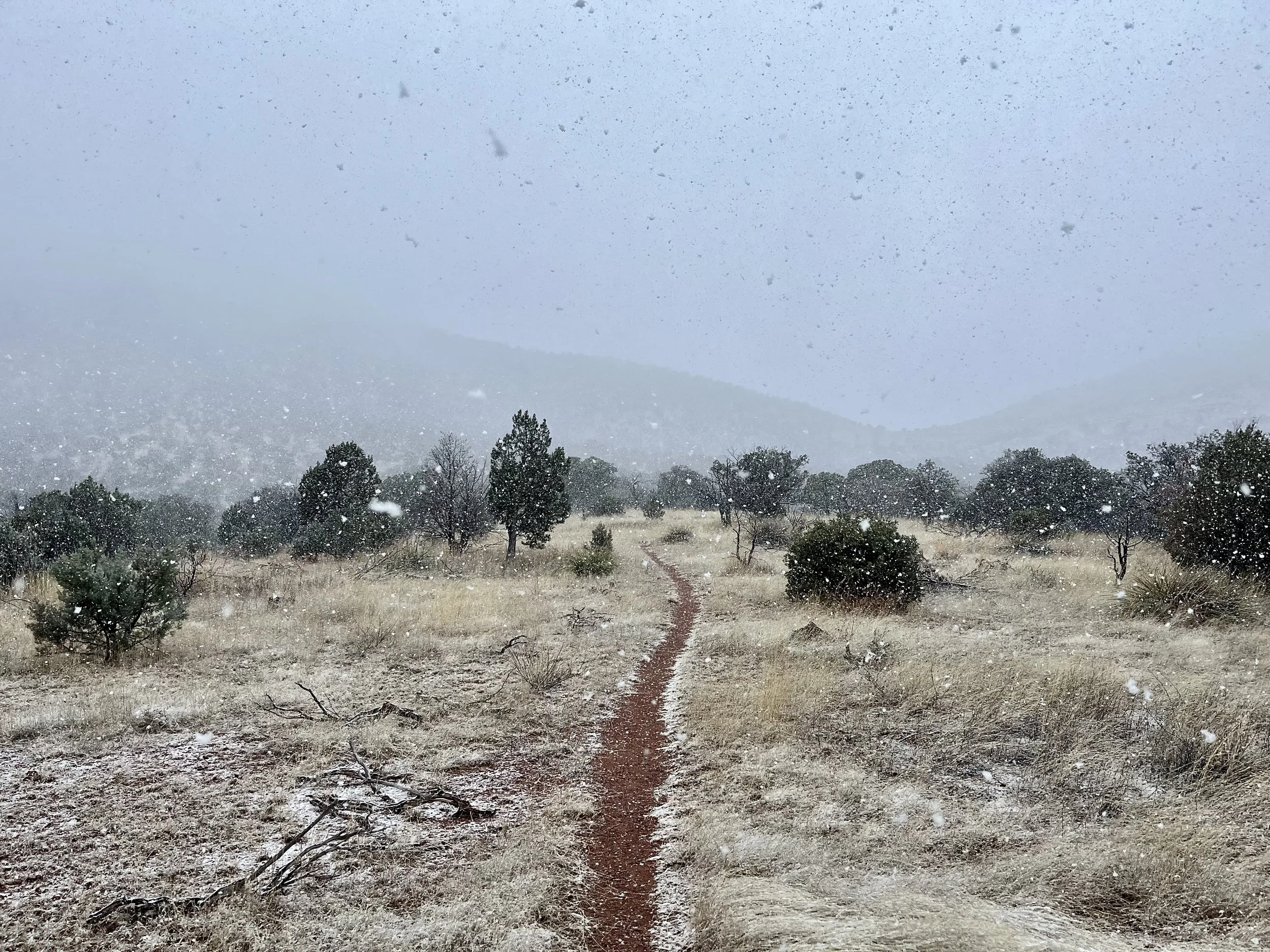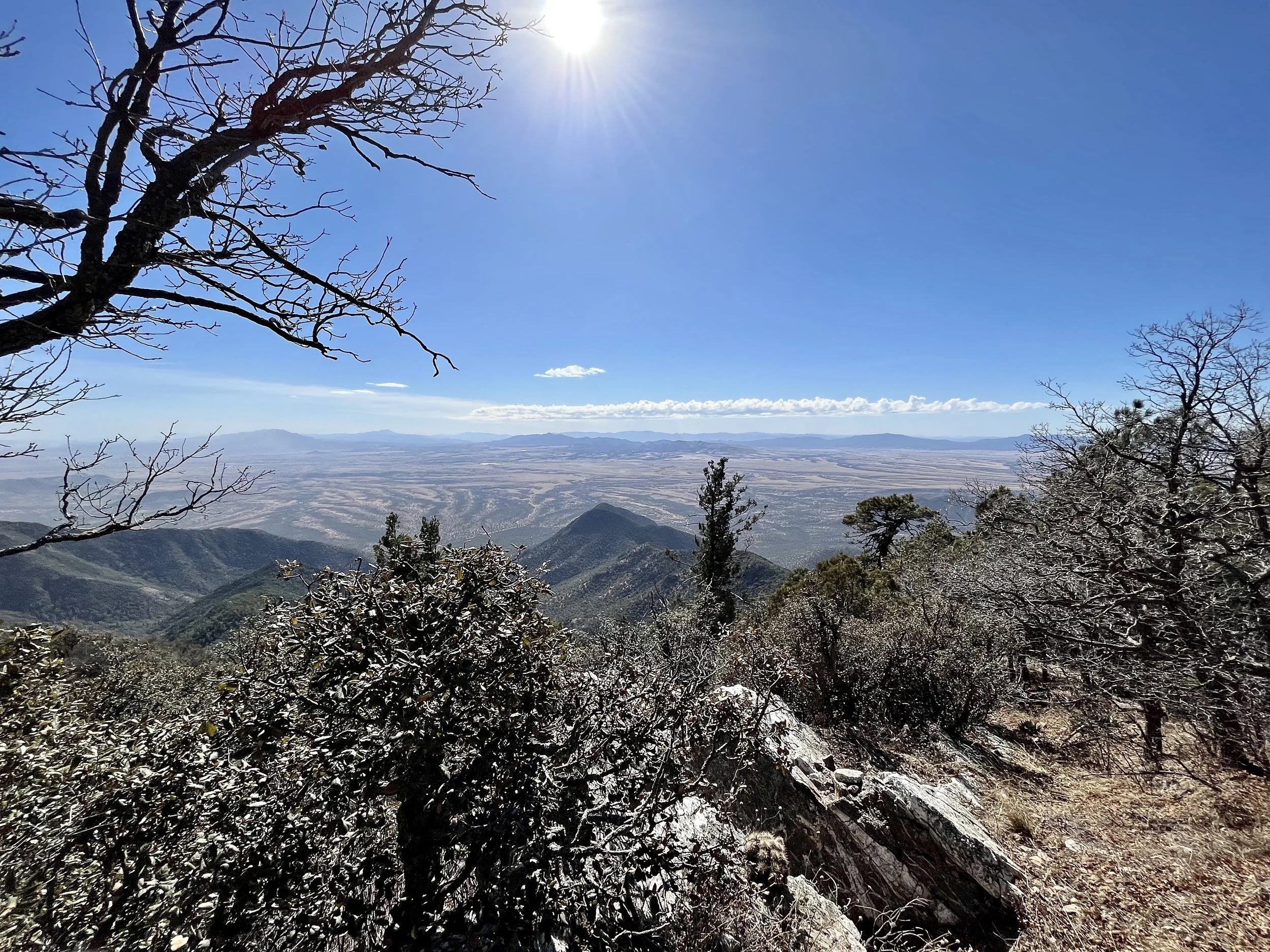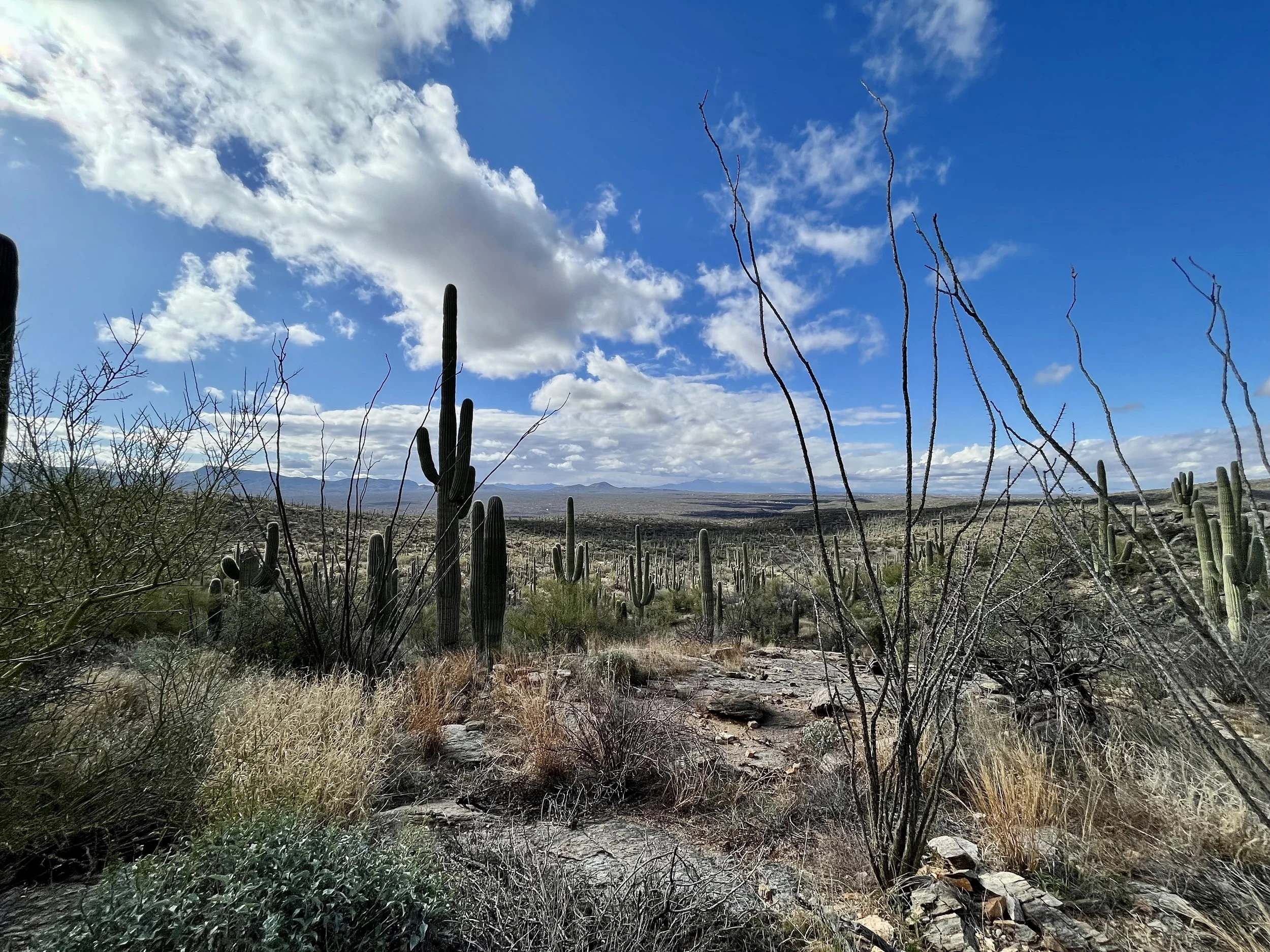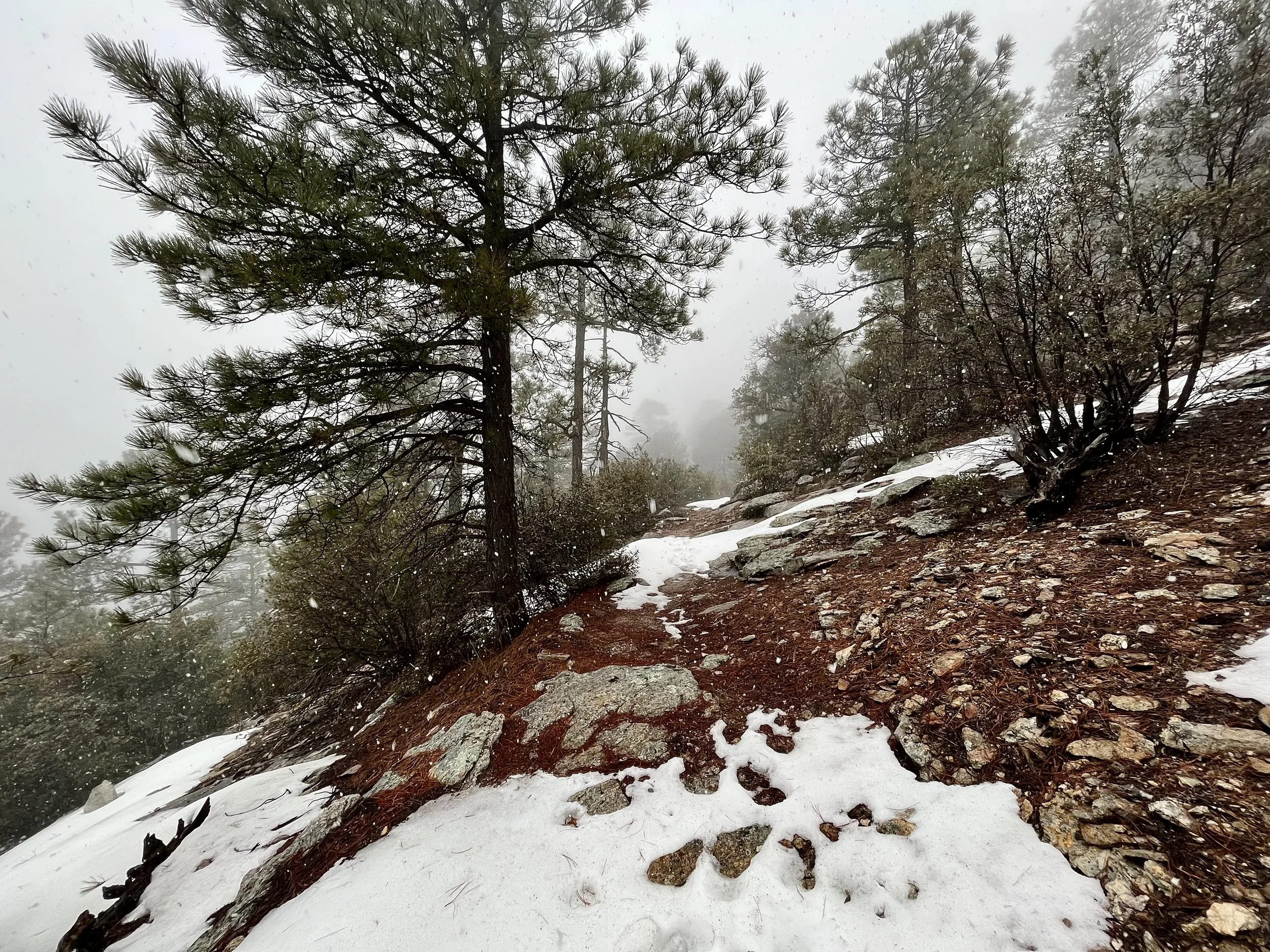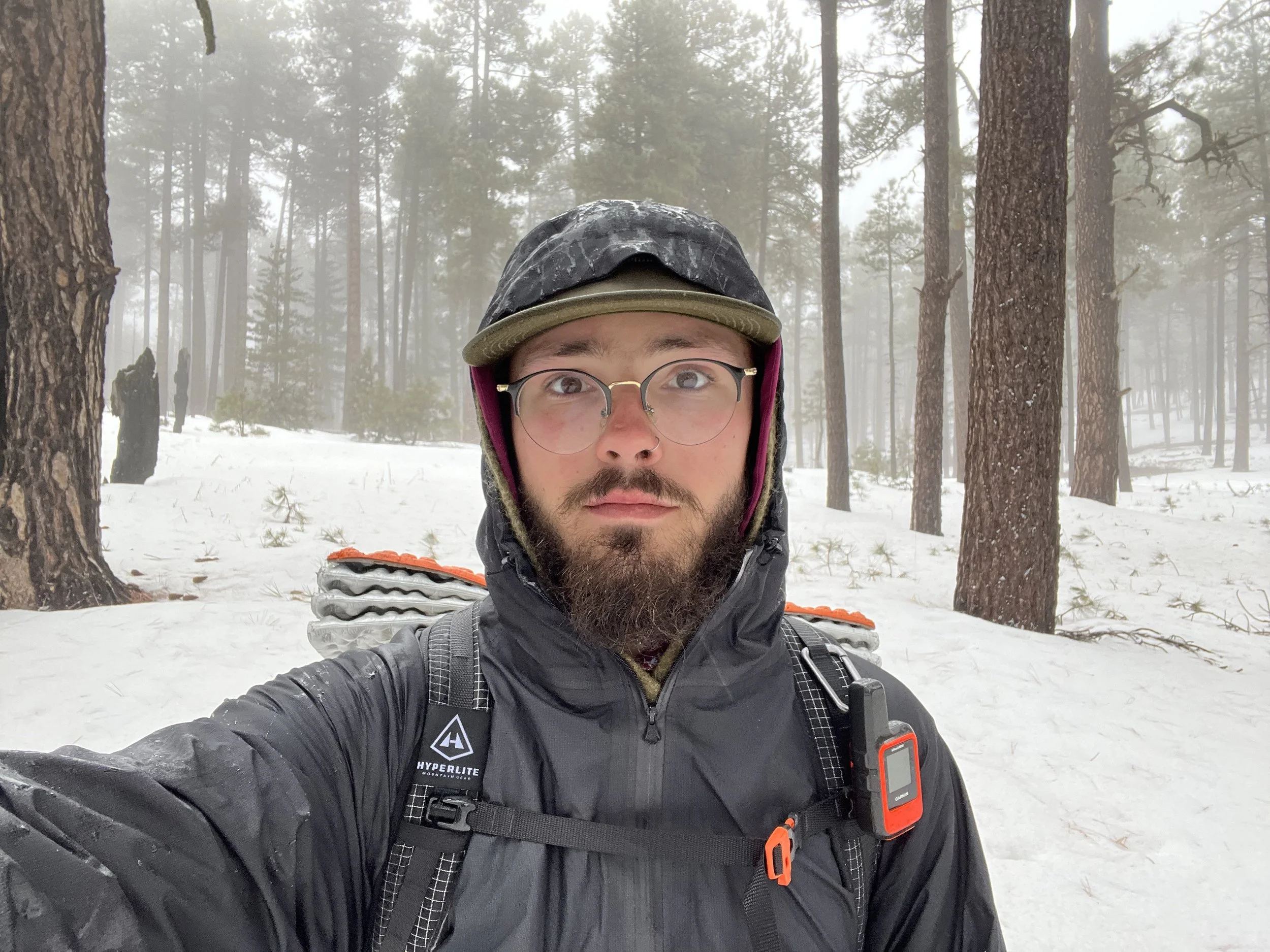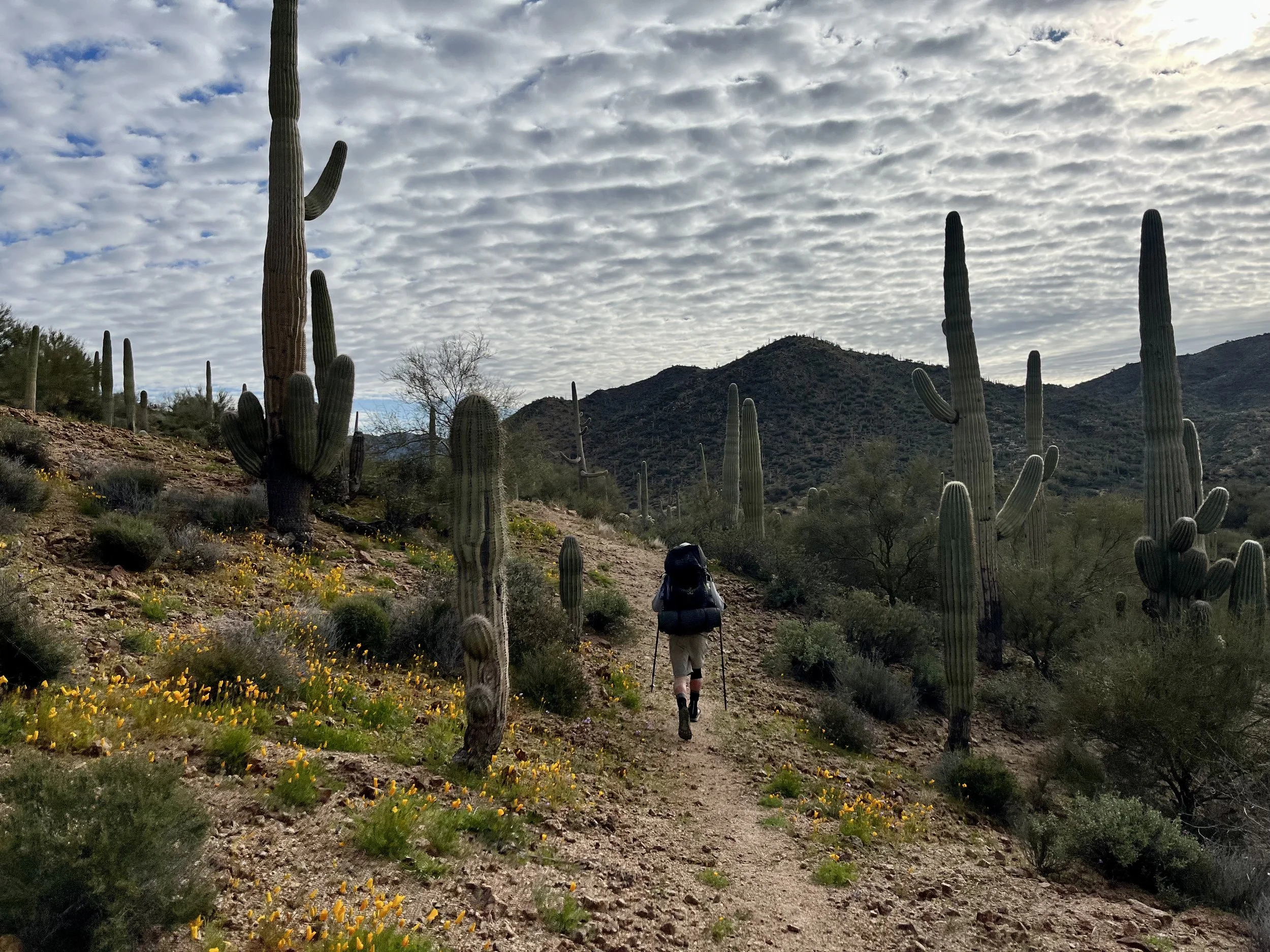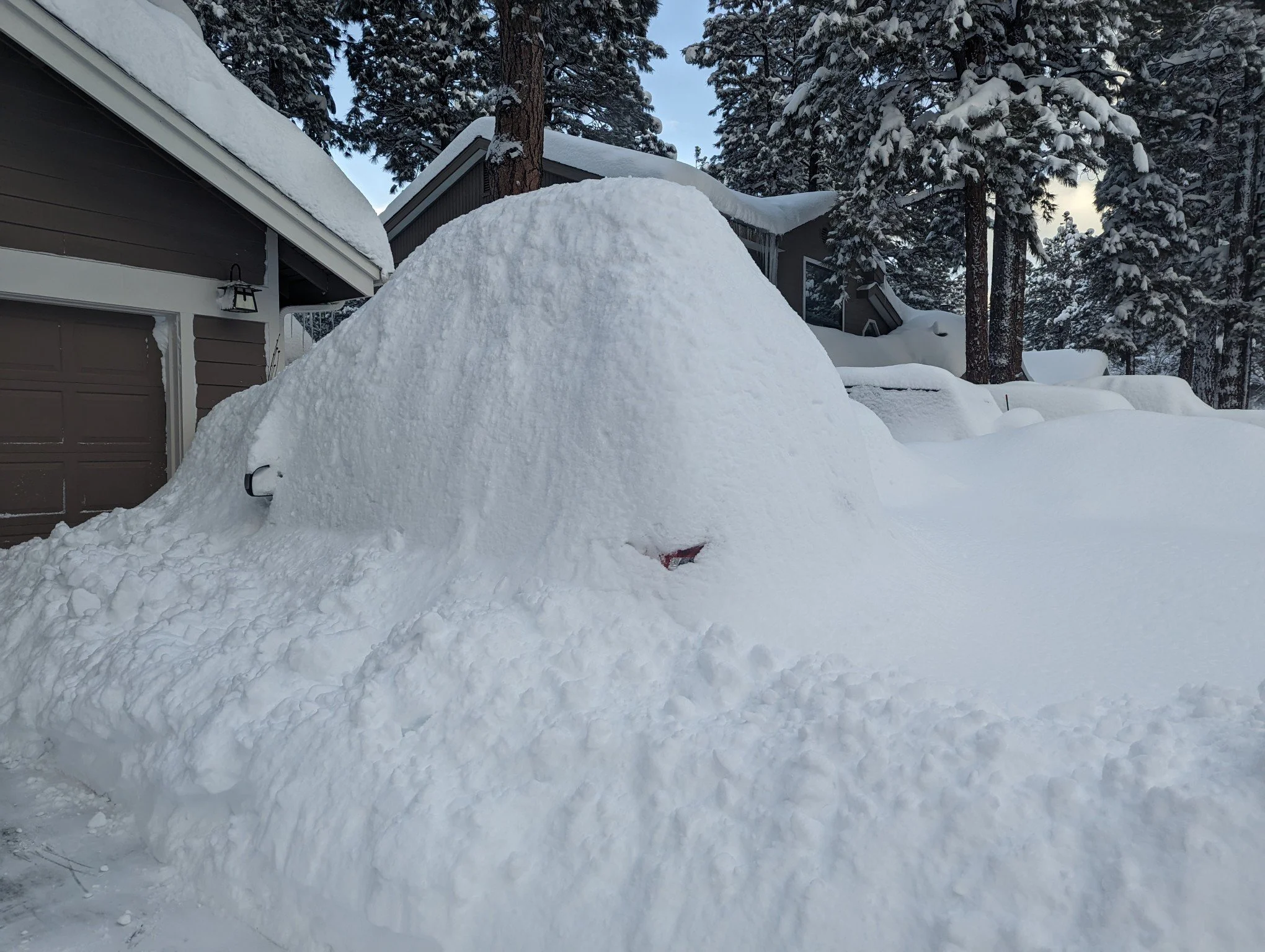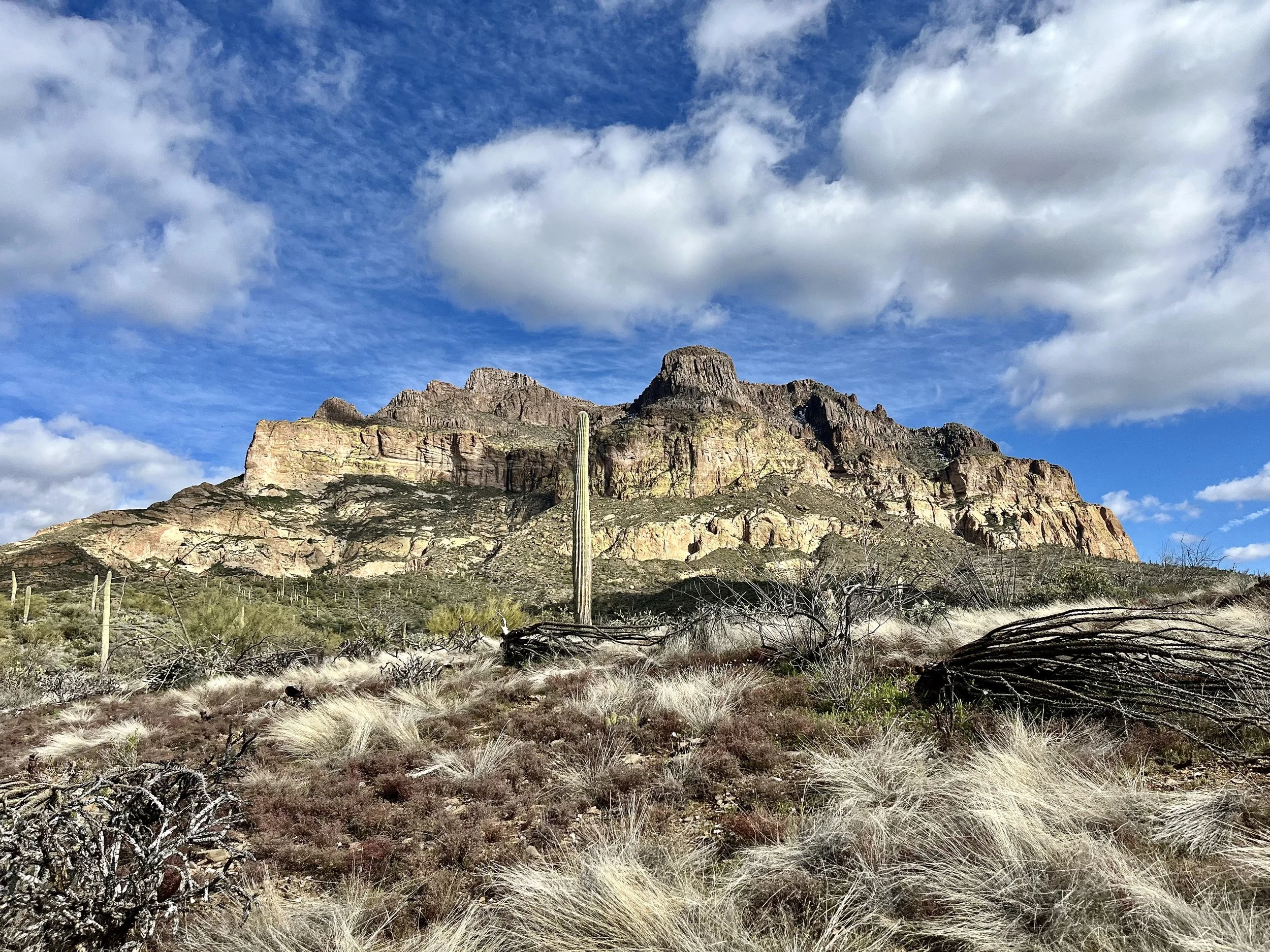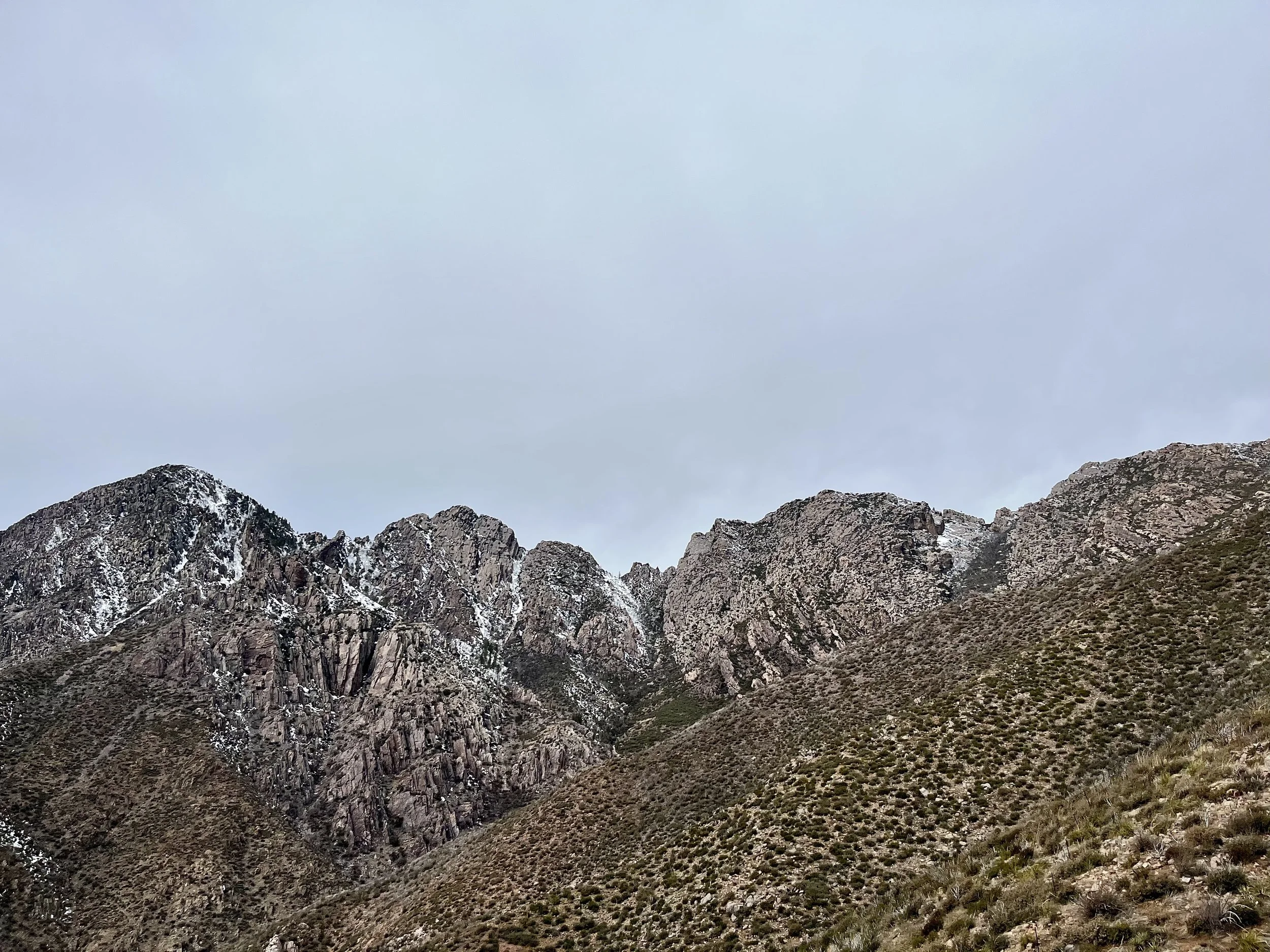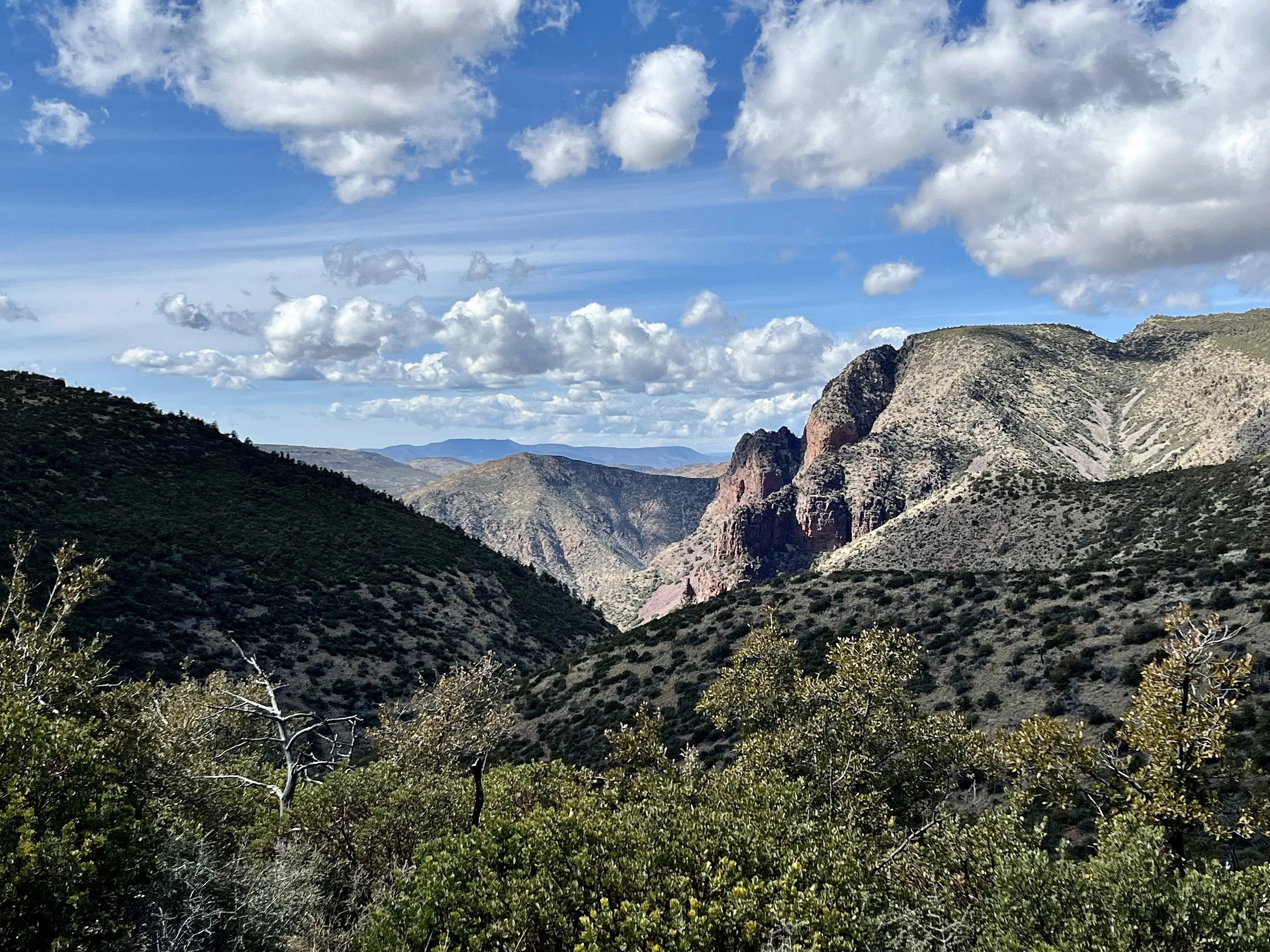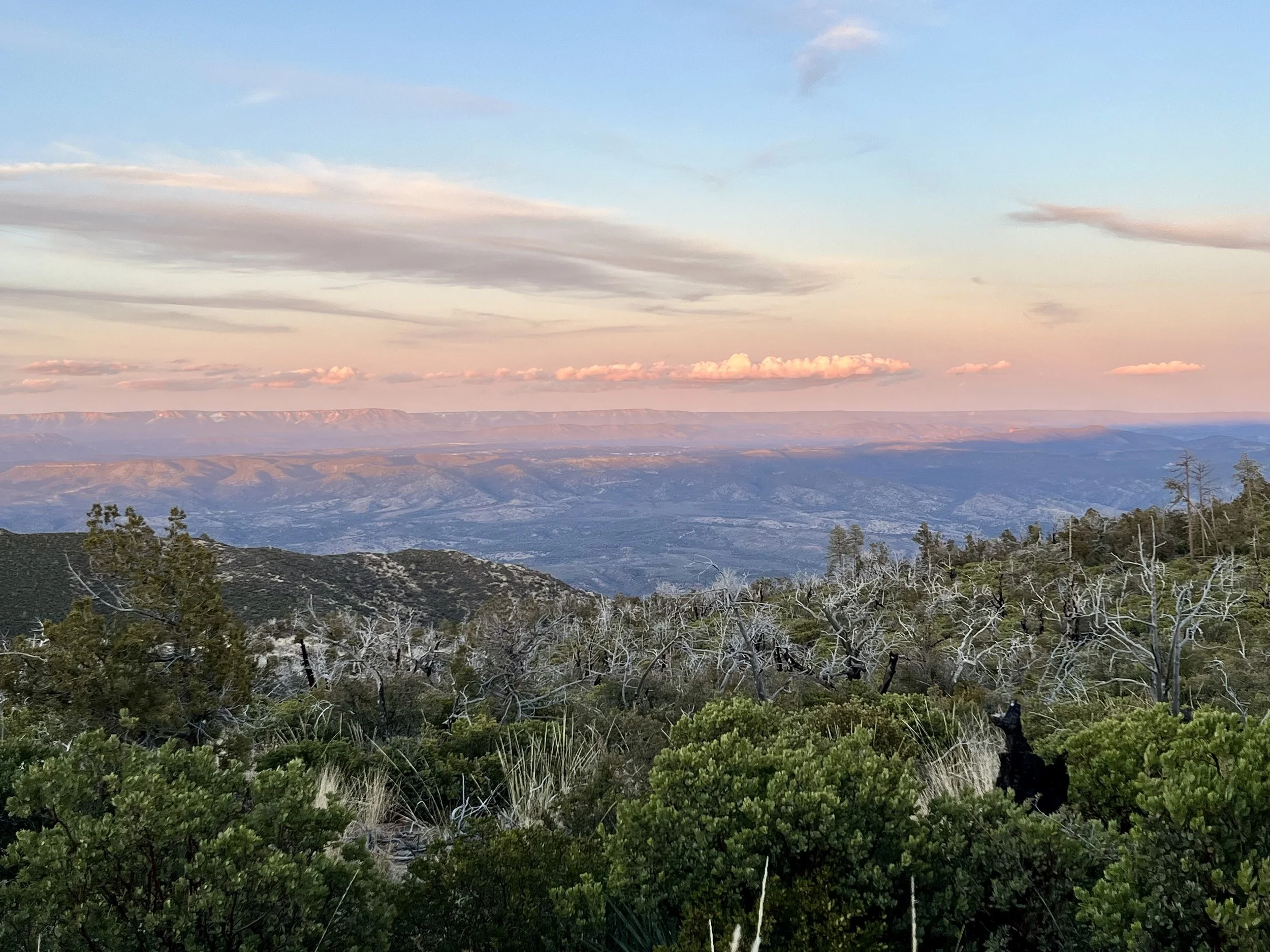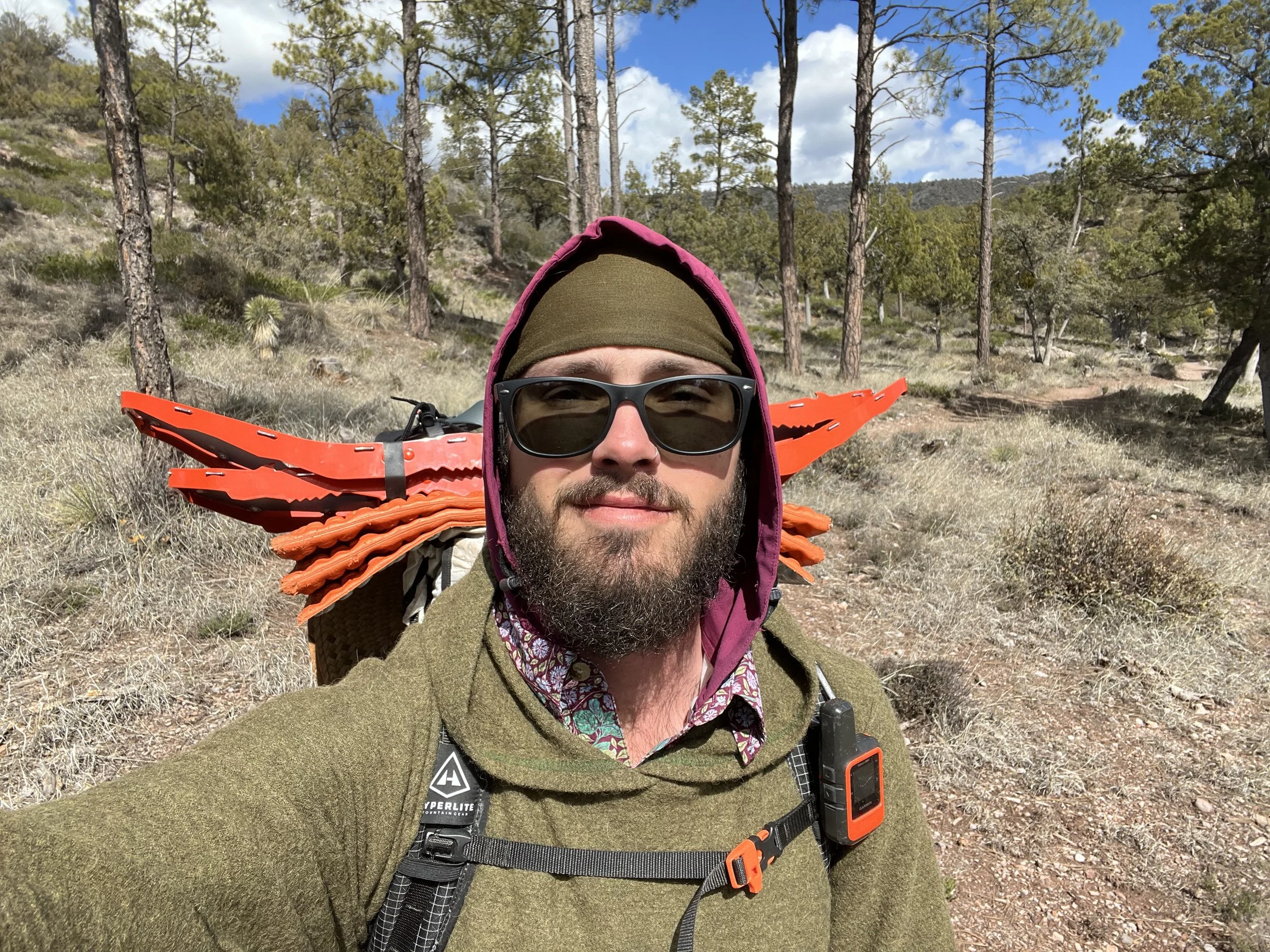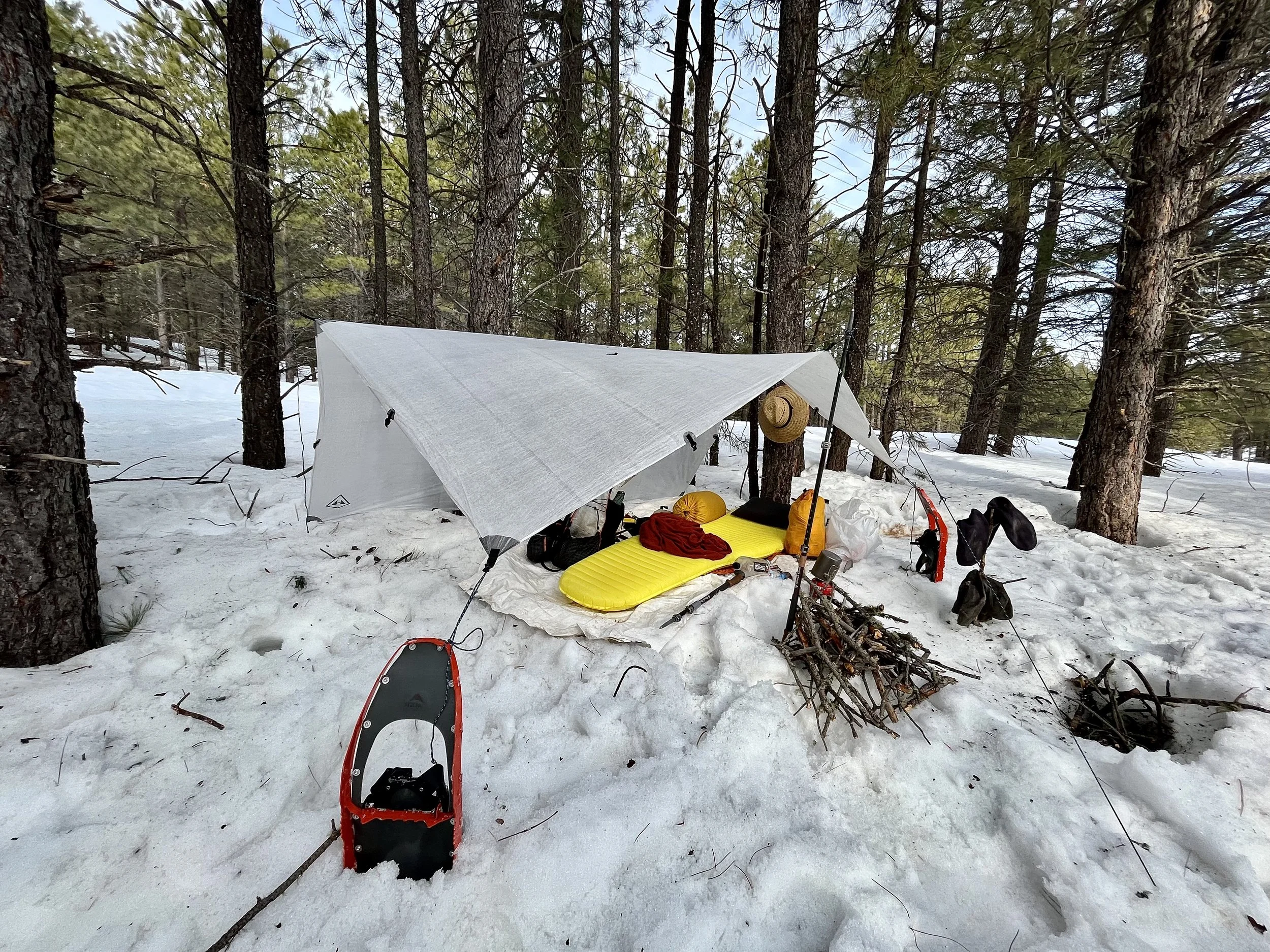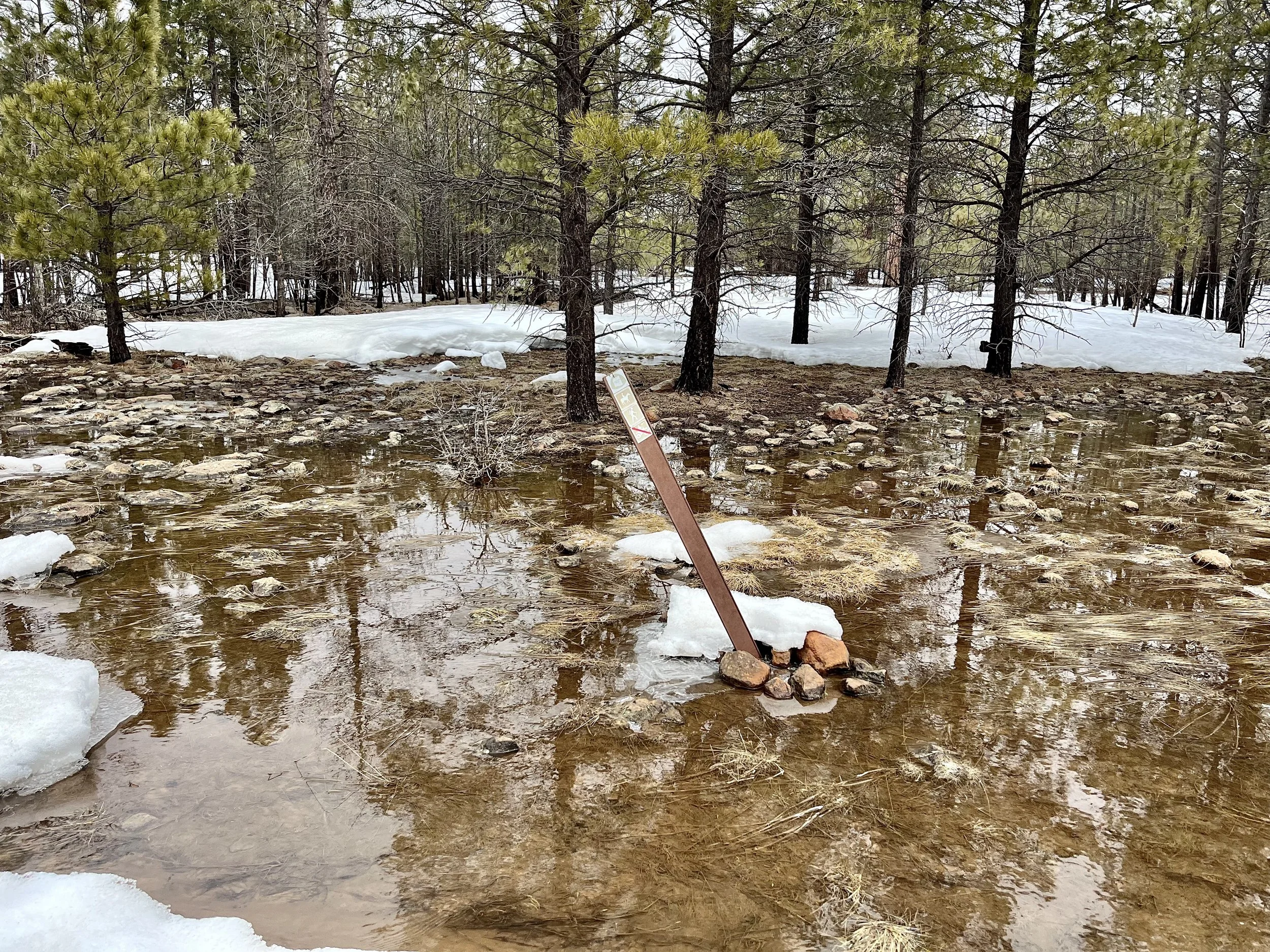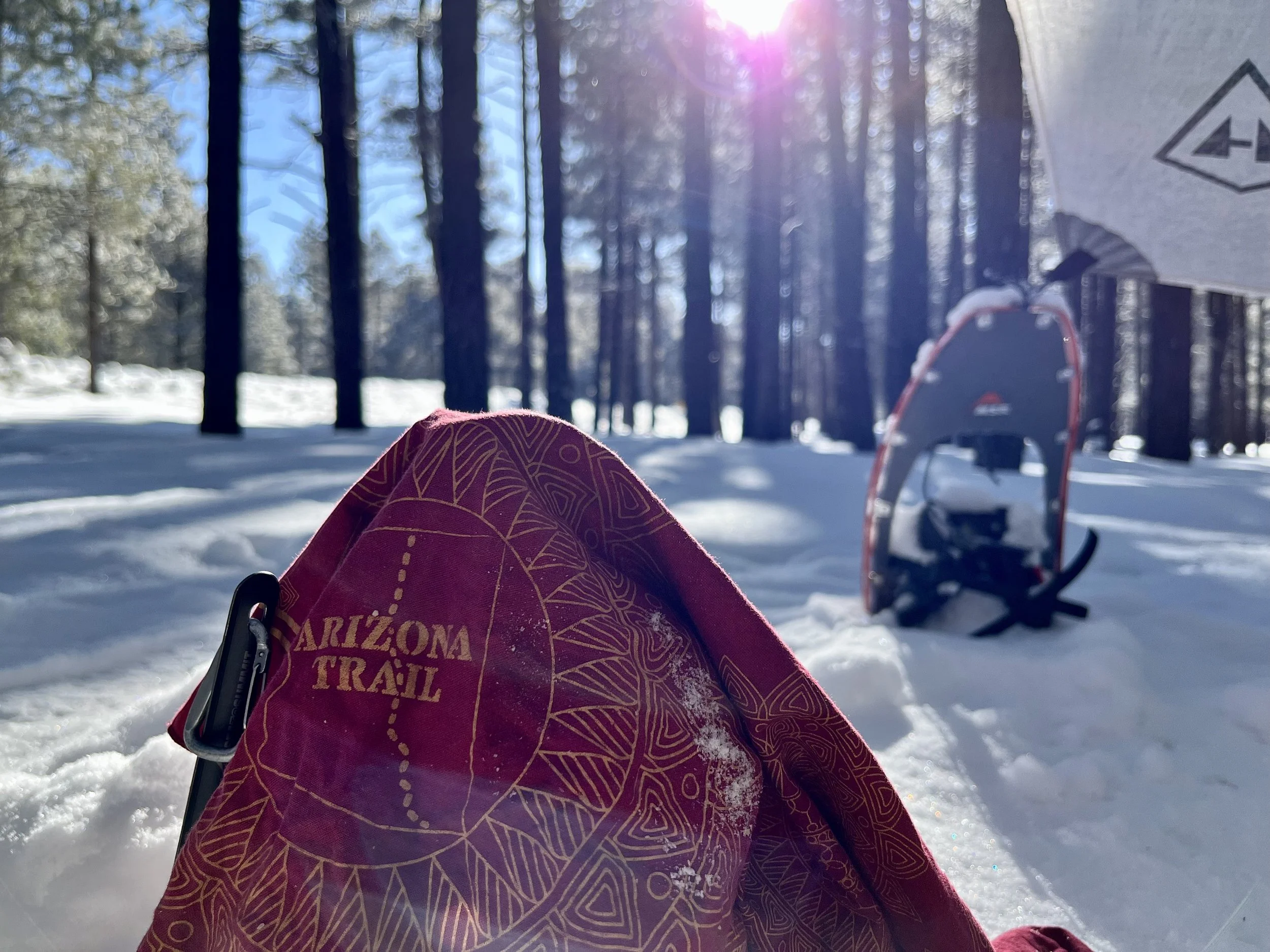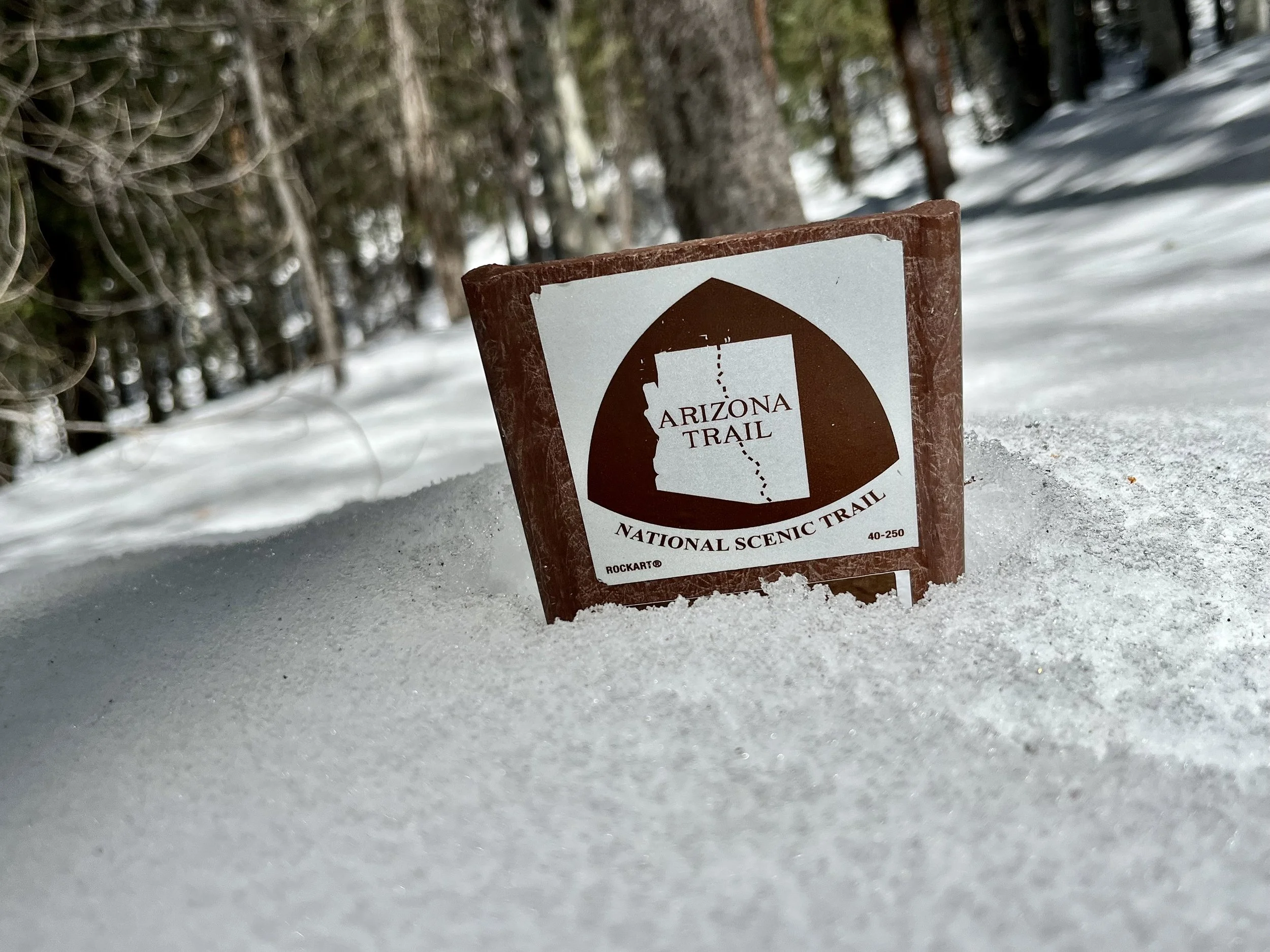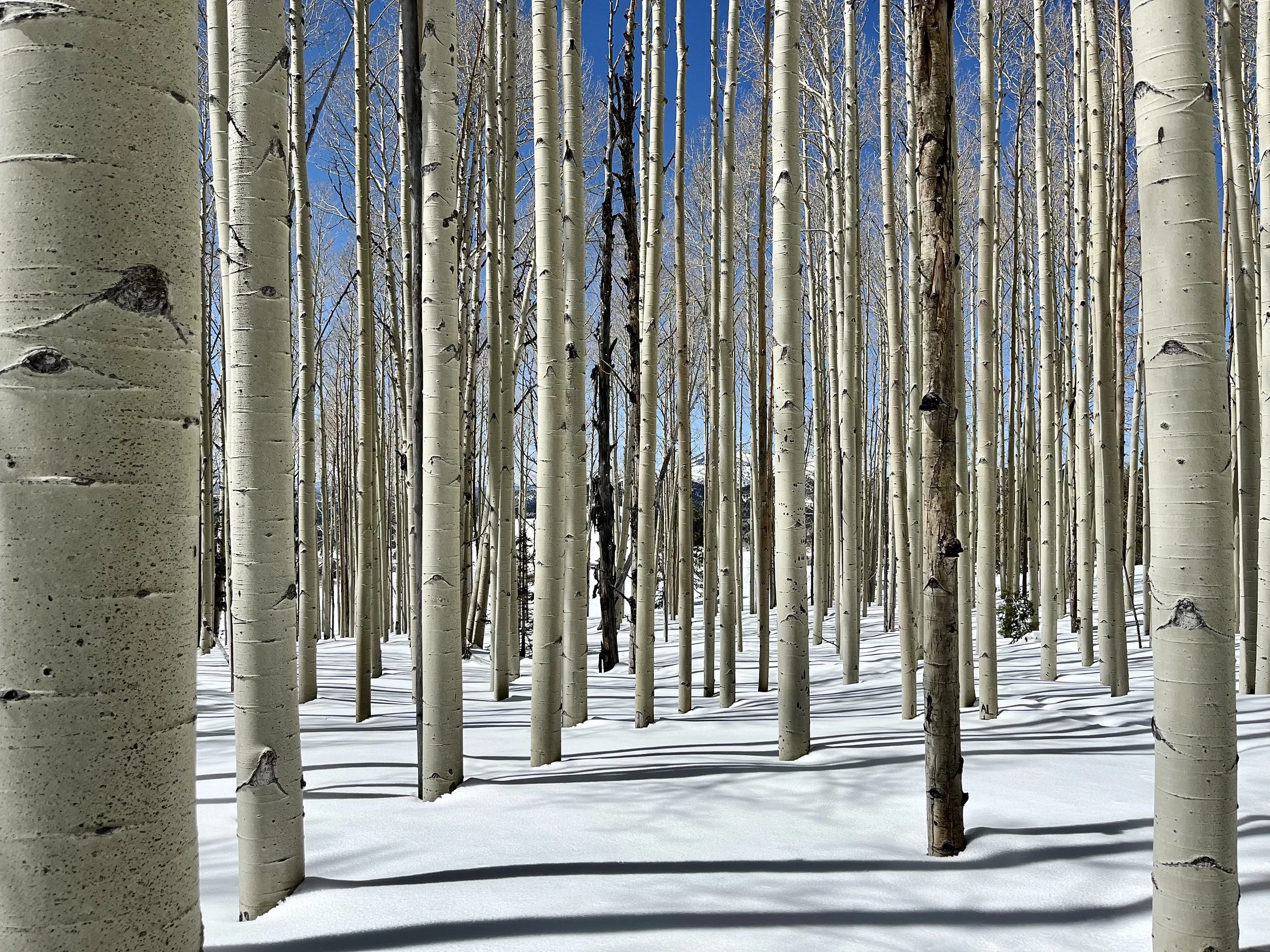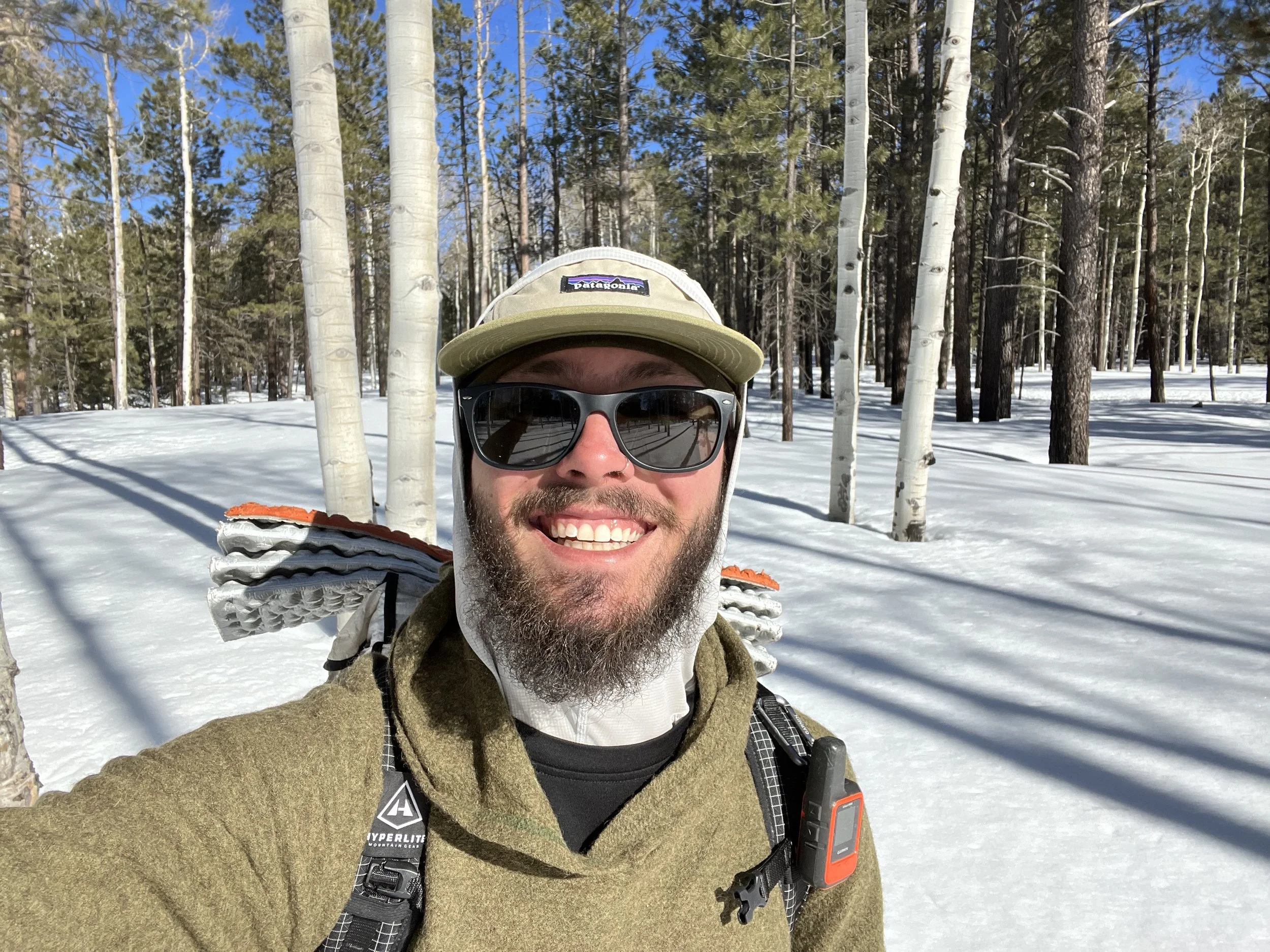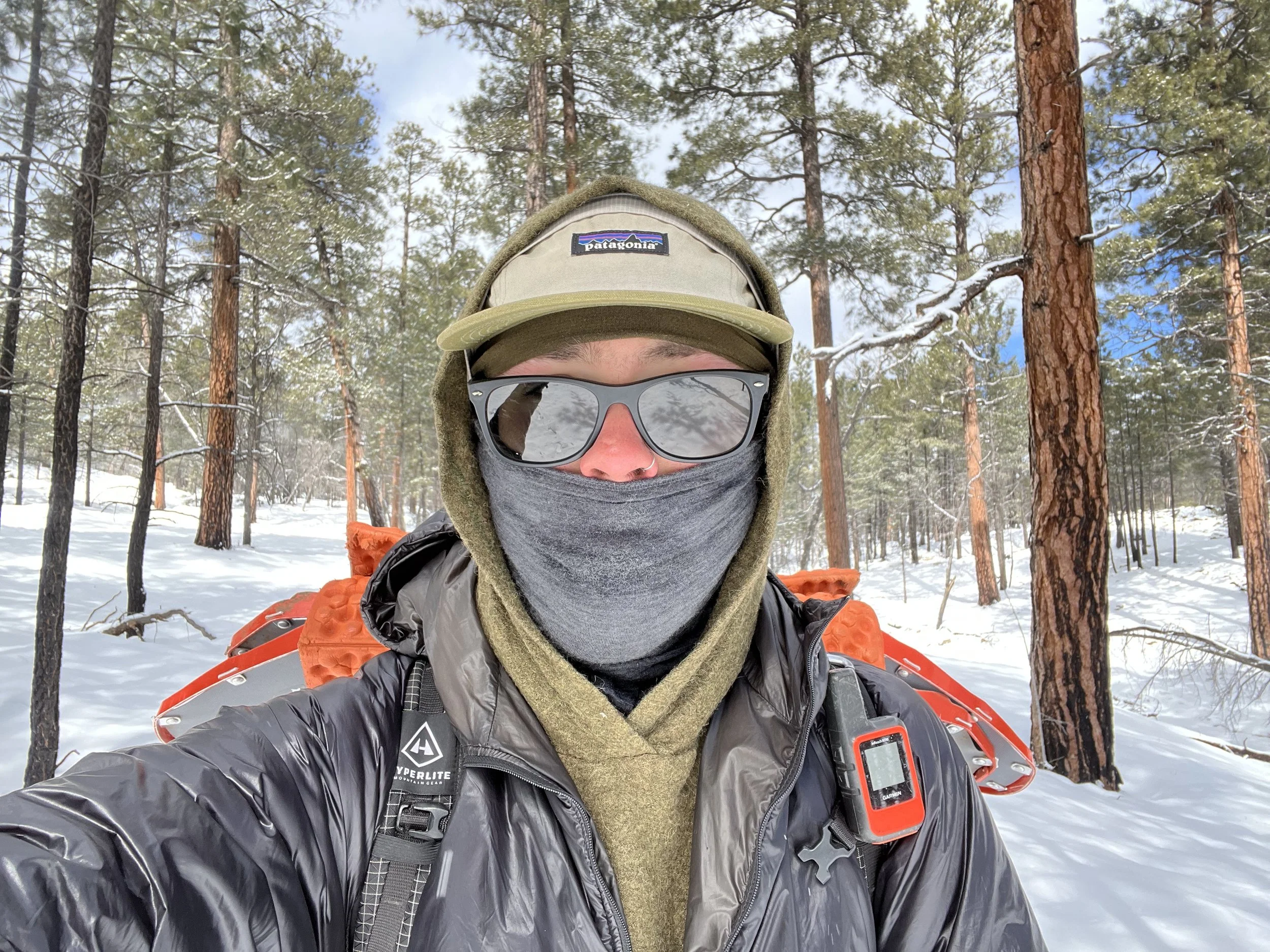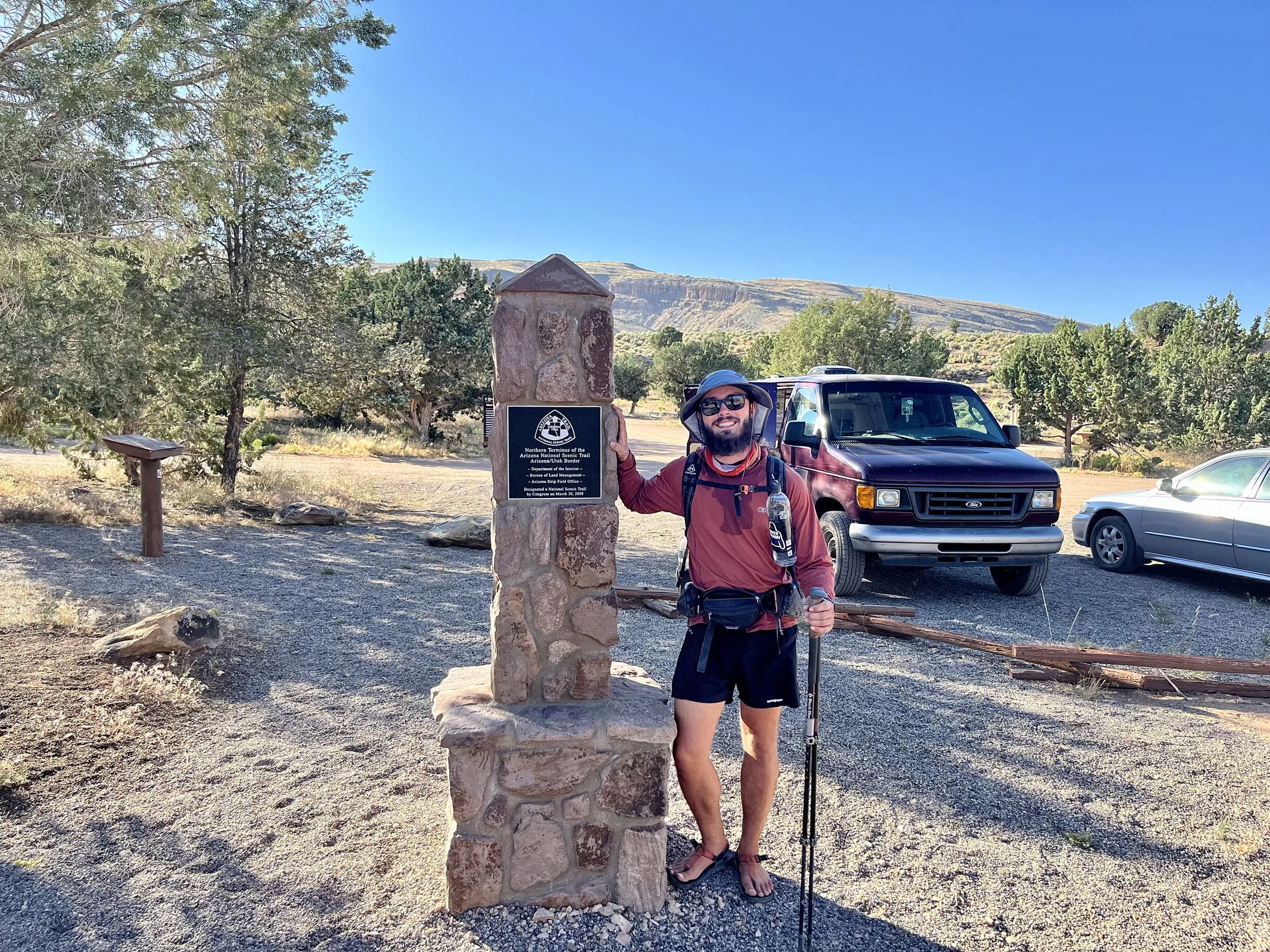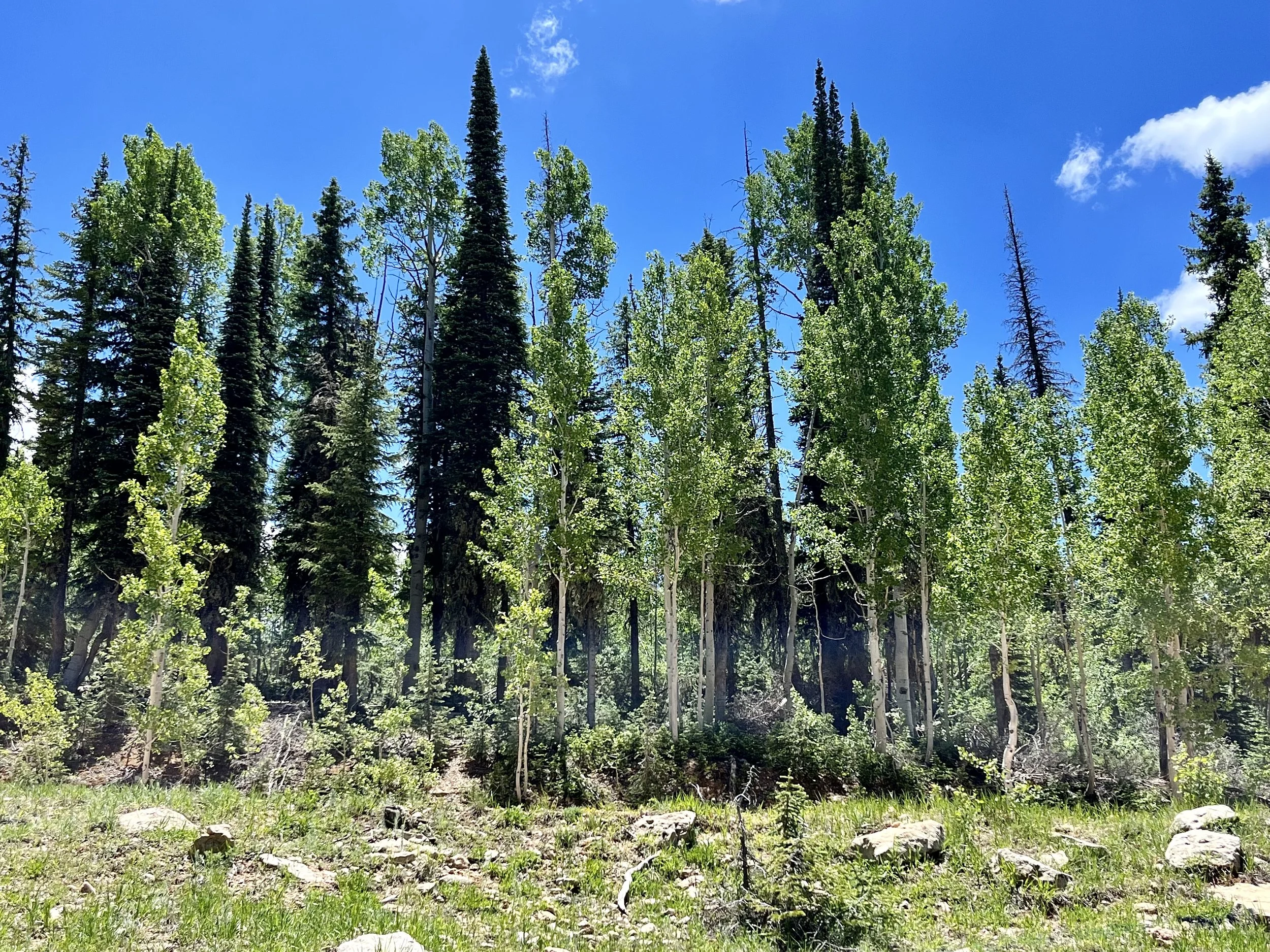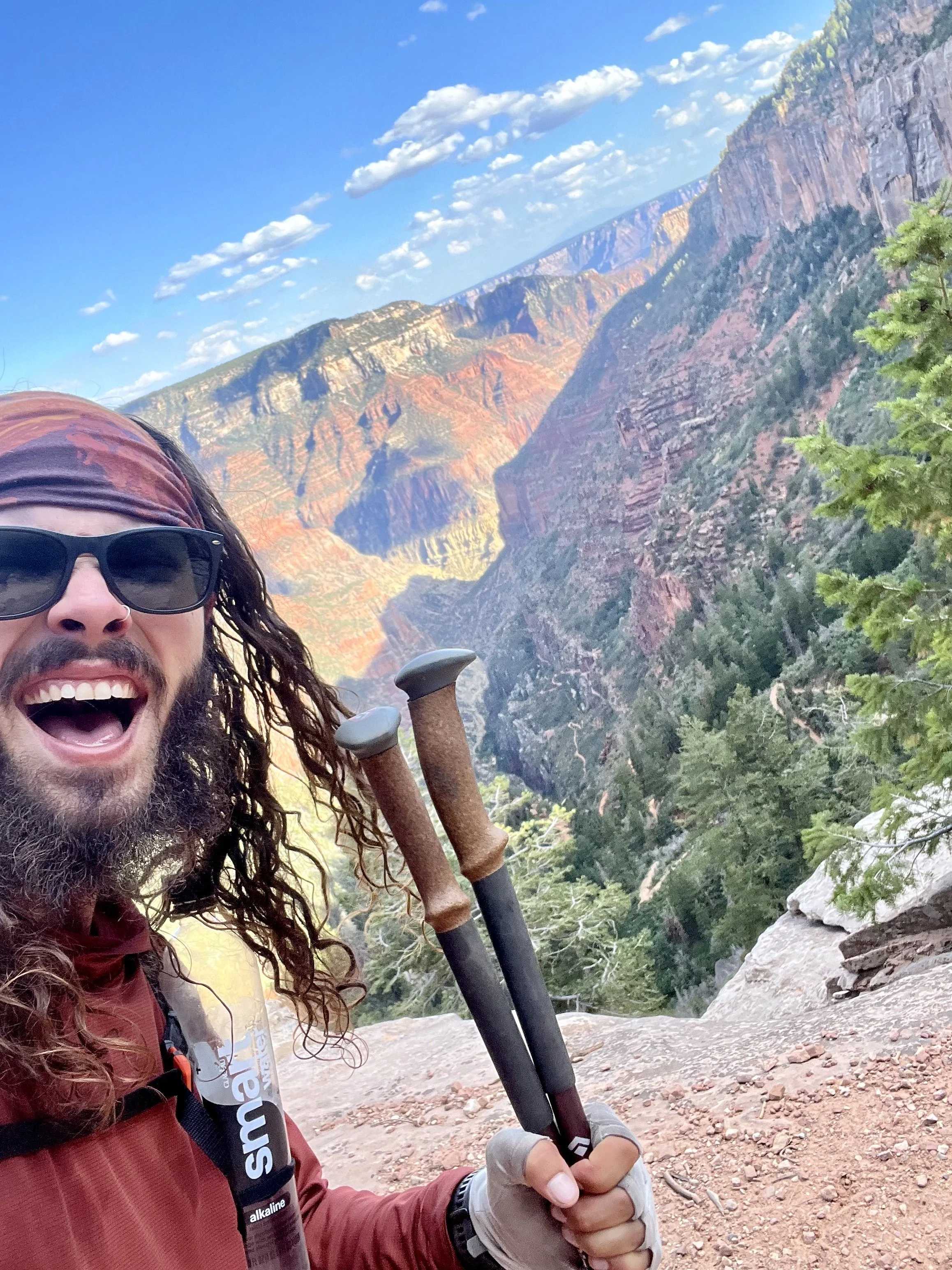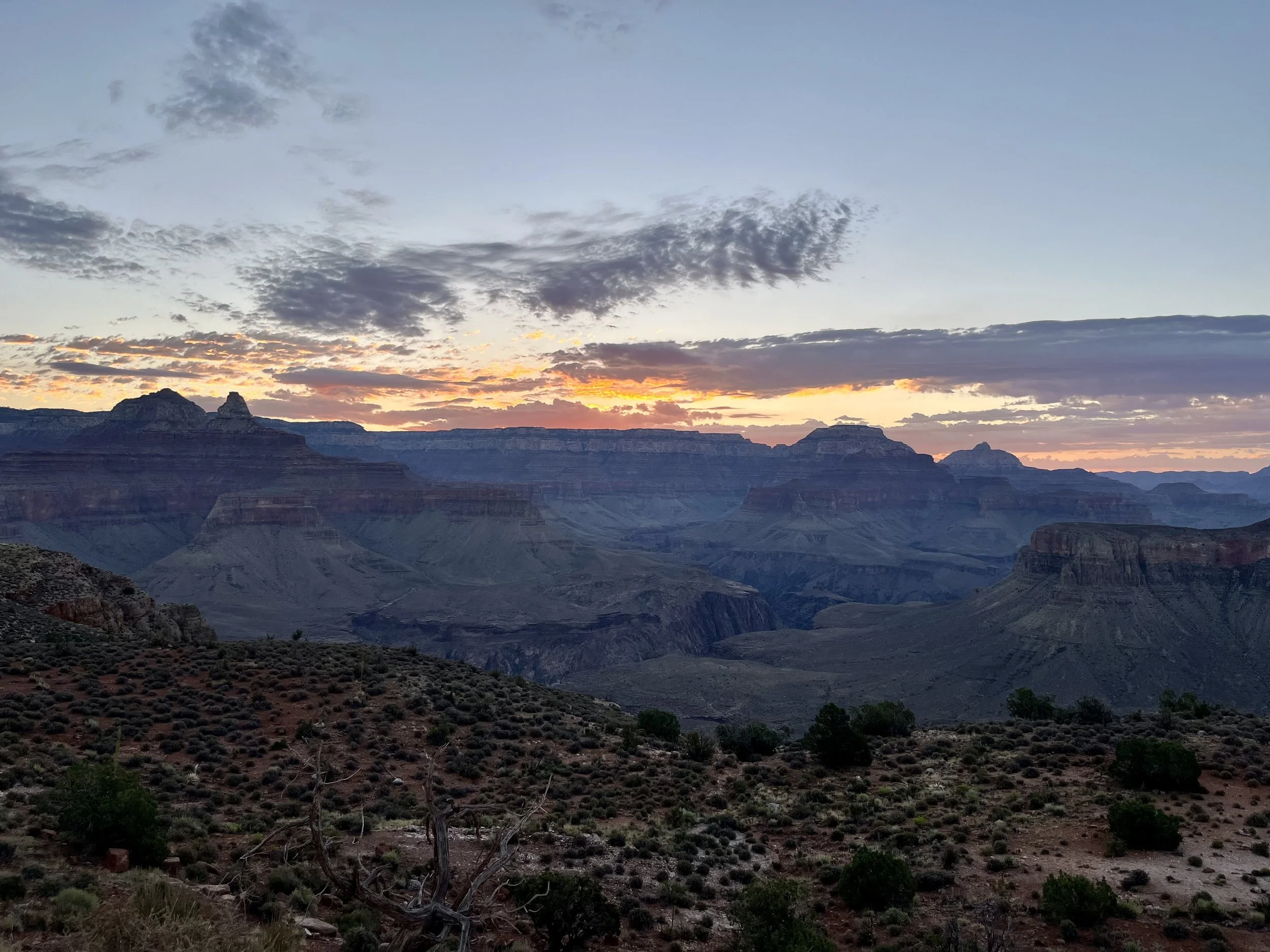Arizona Trail - 2023 Thru Hike
Beginning from the Southern Terminus.
On February 12th, 2023, I sent out on my AZT thru hike, headed Northbound from the trail’s Southern terminus at the US / Mexico border. I knew that my early-season start would present winter weather challenges, as well as the possibility of having to snowshoe. I was not aware, however, that this season was shaping up to be one of the snowiest AZ winters on the books.
Day 2 - First snowfall in Canelo Hills.
The Southern Passages of trail are dominated geologically by the “Sky Islands” - A series of individual mountain ranges rising up from the Sonoran grassland ecosystem that surrounds them from their base. This phenomenon creates isolated, higher altitude “life zones” up on the mountains that are surrounded by a “sea” of desert. Many endemic species exist in these higher life zones - species that have evolved and adapted into their own sub-species that cannot leave the high altitude life zones of these “Sky Islands”.
Perched above Sonoran grasslands in the Huachuca Mountains.
One of my favorite sky island experiences was in the Rincon Mountains of Saguaro National Park. I began the day camped under some of the most impressive Saguaro Cactus stands I have ever seen. It was sunny and warm down in the desert today, with a high temperature forecast in the mid 70’s. I had a 6,000+ ft. climb up Mica Mountain ahead of me, and some possible storm clouds were lingering around the mountain peaks, shielding them from sight. I ascended through lush desert flora, eventually reaching Oak, Juniper / Pinyon, and even Ponderosa Pine life zones. Upon reaching the Ponderosas, I had finally entered the clouds - my views off the mountain were replaced with a white haze, and snow began to intermittently cover the trail. Creeks began to change from flowing, to rushing, to raging, and as I ascended higher, snowpack dominated the landscape. The trail ultimately disappeared after Manning Camp, and I found myself post-holing in waist deep snow towards the Ponderosa Pine covered summit of Mica Mountain at 8,668 ft. above sea level. I did not yet have snowshoes at this point on trail, and my heart was racing while kicking steps in to exposed switchbacks on the North side of the mountain. While descending, the storm clouds finally released their moisture as a snow/rain wintery mix. I found myself hiking well in to the night in search of a sheltered campsite at the bottom of the mountain. I woke up that next morning to 70+mph wind gusts - every wash around us that had been dry the night before was now flowing heavily with water.
Beginning the day in lush Sonoran Desert.
Into the clouds and Ponderosa Pine.
Much more snow than anticipated on this 24.6 mile day.
The trail passages of central Arizona were a different story. Warm weather, beautiful desert scenery, volcanic geology, and some thru hiking comradere marked a new chapter of the AZT.
Springtime had reached the low elevations of central Arizona.
Meanwhile up in Flagstaff, my car was unrecognizable under a pile of snow in this photo that was sent to me.
These sections of trail were a significant part of my thru hike. Mild weather meant that I could kick back and relax a bit more, and I felt a strong desire to soak up all the desert I could, knowing how much snow was waiting for me up North above the Mogollon Rim. I really got a chance to “smell the roses”. One of my favorite sections of the entire trail was from Roosevelt Lake up to the Mogollon Rim. Trail conditions still fluctuated heavily due to snow melt runoff and high winds. Many sections of “trail” had turned into flowing creeks, and fallen trees littered the way.
Picketpost Mountain just outside of Superior, AZ.
The “trail” had evolved into a creek in the Superstition Mountains.
Four Peaks - famously featured on the Arizona license plate.
Looking back on the Sonoran Desert from North of Four Peaks.
The Mazatal Mountains - A hidden gem of central AZ.
Looking North to the Mogollon Rim - the beginning of the Colorado Plateau.
On the way up to Pine, I had the deepest water crossing of the trail at the East Verde River, where the water was waist deep (I am just under 6’ tall). It is worth noting here that the AZT was not all sunshine and rainbows. It was a very difficult endeavor given this year’s weather conditions, and by this point on trail, I was dealing with mild trench foot almost everyday from constant water crossings and snow traverses. That being said, pushing my comfort limits in the outdoors was a beautiful experience that I learned a lot from, and I feel that exposing myself to such suffering helped me grow exponentially as a human.
Upon reaching the town of Pine I added snowshoes to my kit, as well as a few other winter essentials such as gore-tex mittens. The Mogollon Rim was going to be a whole other level of difficult, and my prime focus shifted to successfully reaching Flagstaff.
Loaded up with gear leaving Pine, AZ.
Snowshoes became essential immediately after cresting the Mogollon Rim. Note the snowpack in comparison to the street sign.
First night camping on snow. A campfire was necessary for drying out gear.
Large bogs of water existed in lieu of snowpack at lower elevations
Long and difficult days were balanced with beautiful moments like this one. It felt as if I had this entire winter wonderland all to myself - not a single sign of another human in sight.
I was getting close to Happy Jack when I reached cell service and started receiving messages wondering if I was okay. It turns out the storm that was blowing in that night, only a mere 4 inches of snow forecast the last time I checked, was now forecast to be up to 2 feet. Already wet, cold, and in low spirits, I made the tough decision to bail over to Lake Mary Road, where a friend would pick me up and bring me to Flagstaff.
I hit one of the lowest lows I have ever felt while in Flagstaff. I felt defeated and drained. I was unsure if I had any capacity left for suffering to move forward on trail. As the days went on, a strange feeling started to overcome my exhaustion, and it was much worse. I had failed. It had immediately become obvious that the horrible feeling of not being out on trail - of not completing what I set out to do, was much worse than the discomforts I felt while out on trail.
I assembled my gear and prepared to get back out on trail with a fresh mindset and outlook on the experience.
Back on trail. Coldest night so far at 11 degrees Fahrenheit
Beautiful day at Mormon Lake. Normally dry, Mormon Lake has not been full for about 20 years.
Sunset over Lake Mary.
After reaching Flagstaff, this time on foot, I did not waste much time before getting back on trail. I had a tight window to reach the South Rim of the Grand Canyon before having to head back to work and guide a trip. The San Francisco Peaks were calling my name.
Roughly 3 feet of snow lingered through the SF Peaks.
The Aspen groves in the SF Peaks are among the best in Arizona.
Spirits were high with not just a new outlook on trail, but on life and suffering.
Snowshoeing across Northern AZ.
The Peaks had been conquered, and I was rewarded with dry trail.
Like, really dry, windy trail.
As I began to gain elevation again approaching the South Rim, the trail grew wet and snowy again. Temperatures were also dropping dramatically. It was at this point that things were not going my way anymore. I was running out of time, money, motivation, and a nagging foot injury was causing extreme pain - a foot injury I had been dealing with since around mile 50.
After a rather unpleasant day leading up to the South Rim, I made the decision to get off trail until winter finally ended in Northern Arizona. It was a very tough decision, and all other factors aside, I did not feel prepared for the beast waiting for me on the remote North Rim. I had received a report that snowpack lingered all the way to the Utah border, and I did not have a single step of snowshoeing left in me. I had traversed 670 miles across Arizona, with about 100 of those miles cumulatively on snowshoes. I carried the snowshoes for about 250 miles.
My last day of the initial AZT push - A brutal wind chill of -9 degrees Fahrenheit numbed my face.
Fast forward to the beginning of July. I had finally found a break in my work schedule to go out and tackle the remaining 120 miles of trail I had left. I was determined to finish my hike before Fall, when Southbounders would begin hiking. This was a dramatic change in trail conditions - July saw some of the hottest temperatures recorded in Arizona. What a year for thru-hiking.
I began this time from the Utah border, heading South towards the point I had gotten off trail at the South Rim. This decision was made for easier logistics, and it seemed like a cool concept to finish my thru hike with the Grand Canyon.
Beginning the final push from the Northern Terminus
This final section of the AZT was a drastically different experience from the original push. Instead of snowshoes, I wore sandals. 90+ degree Fahrenheit temperatures were forecast everyday. Water was scarce, and usually green / yellow. It was fascinating to experience the trail in such a way, and I was able to carry an extremely light pack given the conditions (9 lb. base weight). The most challenging part was mid-summer heat in the Grand Canyon. The day I planned to traverse the big ditch, the inner canyon high was 118 degrees Fahrenheit. I attempted to avoid this heat by hiking an overnight rim-to-rim, but the heat was still very difficult to deal with, even at night. My final day on the AZT was a 24 hour, 43 mile push, including a rim-to-rim of the Grand in July heat.
Dirty trail feet. In my time off trail, I had completely re-thought footwear and its effect on hiking form.
Peak summer conditions on the Kaibab Plateau provided an entirely new hiking experience.
Dropping in to the Grand Canyon.
Morning’s first light from under the rim.
Upon reaching the Grandview Watchtower, my 2023 thru hike of the AZT was complete.
The Arizona Trail was the most amazing thing I have accomplished with my life thus far. I learned more than I ever thought I could while walking from Mexico to Utah.
I can only wonder what adventures lay ahead for me after this one.
Cheers.
